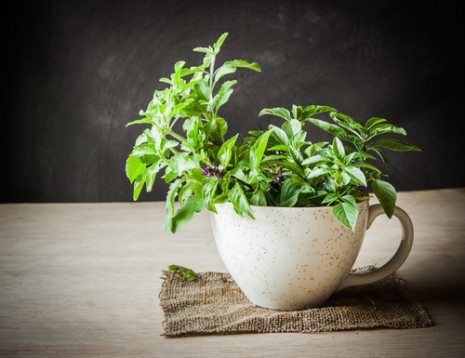
I love to share with you guys what is happening in my life, especially as it relates to my favorite staples at any given time. Lately, I’ve been drinking a lot of Tulsi tea. Since the weather is warming up, you can make and drink Tulsi, or holy basil tea cool in the fridge, by making a big batch and keeping in a pitcher. Personally, I drink hot tea year-round, so I drink my tulsi tea hot, especially in the evenings when I’m winding down before bed.
I am loving it for its fortifying, healing properties as well, and I find that it’s a great sleep aid. I like it plain, or maybe with a little bit of raw honey. But let’s get into more tulsi talk first!
Pretty much everyone is familiar with basil as a staple herb in most kitchens, but I’ll bet you didn’t know that there are an estimated 40 different varieties.
Everything from the most familiar, Sweet Basil, to some more exotic and unusual ones, like lemon, amethyst, and tulsi basil are cultivated and grown worldwide. While they are all members of the mint family, there are variations in flavor, bouquet, coloration, and intensity that set them apart from one another.
Mint family?
Yes it’s true! And while you don’t taste it in your typical pesto or marinara recipe, tea made from the tulsi variety has this wonderful, somewhat spicy, gingerminty (is that a word?) flavor that really keeps you coming back for more.
Even more intriguing, while basil can elevate the flavor profile of many dishes, it is not just for cooking. There are some really awesome nutritional benefits I want to share with you also about these seemingly “common” herbs. Basil is also prized for its many beneficial therapeutic attributes. In fact, it has a long, rich history of use both as a culinary powerhouse, and as a medicinal marvel.
So that’s why it’s called “The Incomparable One…”
The name ‘basil’ speaks of the rich history of this herb – noble for some, and sacred for others. Coming from the Greek word for royalty, Ocimum (basil) in its many varieties has woven itself into the tapestries of numerous cultures around the world dating back more than 3,000 years.
In India, it is a symbol of hospitality (among other things), much like the pineapple in Western cultures, while in Italy, common basil was a symbol of hate, and sweet basil a symbol of love.
There is even some lore which maintains that basil was once used as a test of chastity. According to the legend, the leaf would wither when placed in the hands of the “impure” (this made me smirk also :) ).
Basil easily grows in many regions throughout the world, favoring moist, temperate conditions. It is originally thought to be a native of India where the Tulsi, or Tualsi variety features prominently in the Hindu spiritual culture as well as being prized as a potent medicinal herb.
The plant is named after the Hindu princess (naturally!) Tulsi, who was in love with the lord Krishna, and is routinely found in places of honor in Hindu homes.
Long a staple herb in the well-stocked kitchen, basil is one of those foods that we know so well, but probably never really knew about. This little unassuming plant is loaded with nutrition and disease fighting properties.
Yes, we love it in our pesto sauce, but did you know that basil has an impressive array of flavonoids which provide protection for our bodies at the cellular level because of their potent antioxidant properties?
Basil is also not only an excellent source of vitamin K and manganese, it also provides our bodies with copper, vitamin A, vitamin C, calcium, iron, folate, magnesium, and omega-3 fatty acids.
The tulsi variety is larger and bushier than what we tend to think of as typical, and it has these lushly beautiful leaves that are lightly serrated at the edges. The Tulsi leaves are rich in essential oils, which is one reason that the plant features so heavily in Ayurvedic medicine.
These oils contain:
- Eugenol (think anti-inflammatory, antibiotic, and anti-fungal)
- Nerol (aromatic, therapeutic)
- Camphor (antiseptic and soothing for the nerves)
- As well as a variety of terpenes (flavor and fragrance compounds).
Eugenol alone has been studied pretty extensively, and has been found to be a true natural powerhouse. In tests, its antibacterial properties have proven to be quite effective in killing bacteria, like staph, which is why it is traditionally used to treat and heal wounds.
As an antifungal it has been successfully used in controlling candida (makes a great mouthwash!) and as an anti-inflammatory, because it can block the activity of an enzyme in the body called cyclooxygenase (wow, that’s a big word!).
A natural herbal remedy…
Many non-steriodal over-the-counter anti-inflammatory medications (NSAIDS), like aspirin, and ibuprofen work by inhibiting this same enzyme. This explains why holy basil is so effective as a trusted herbal remedy for numerous things ranging from minor sore throat all the way up to rheumatoid arthritis and inflammatory bowel diseases.
*Important note: Tulsi is not recommended for women who are pregnant or nursing or for children under the age of 2.
The natural antioxidants in this wonder plant help to strengthen the immune system so you can fight off common colds and flu. They also facilitate cellular repair to help keep your skin vibrant and healthy.
It’s nice to know that if you love to drink tulsi tea the way I do, you probably won’t have to worry about those nasty seasonal bugs.
Speaking of bugs, tulsi is also a natural insect repellent.
You’re kidding, right? Nope! Summer is the time to get outdoors and really enjoy relaxing and having fun, but we certainly don’t want to have to spray our bodies with toxic poisons to avoid mosquitoes and other stinging insects before we step outside!
If you are like me, you love to sit outside and read or meditate on your deck or patio, but sometimes the bugs can chase you right back inside. Yes, we understand that this is their home too, so we don’t want to resent them, but don’t let them prevent you from communing with nature! Simply surround your seating area with some beautiful potted basil plants to keep the bugs at bay.
If you plan on being more active, like doing some gardening or hiking, try making this awesome spray out of the liquid from the boiled and strained leaves – make sure you squeeze them to extract all the liquid!
Tulsi Bug Spray Recipe
Ingredients
- 1 cup holy basil water
- 1 cup clear aloe vera gel
- 20 drops of Aura Cacia tea tree oil
- 20 drops of Aura Cacia citronella essential oil
- 10 drops of Aura Cacia rosemary essential oil
Instructions
- Boil 1 cup of holy basil and extract the liquid from the boiled leaves.
- Let the liquid cool.
- Combine with all other ingredients listed and pour into a portable spray bottle.
- The fragrance is amazing, and you won’t be bothered by those pesky insects!
- If you do happen to get bitten – no matter – Tulsi to the rescue! Simply boil the leaves and apply them directly to the sting 2 or three times a day for welcome relief.
mmm… the smell!
Tulsi has this amazing, spicy, sort of dusky clove fragrance which comes from the essential oils that are contained within the plant itself. It is the nerol, camphor and terpenes that make it such a potent aroma therapeutic herb.
Traditionally used to bring harmonious balance to the body in Ayurvedic healing, tulsi is known for promoting joy and virtue, as well as helping stabilize metabolism and promoting healthy liver and kidney function.
Holy basil has earned its classification as an adaptogen because it has been shown to reduce our natural sensitivity to stress. Stress is a major cause of illness in western culture and, if left unchecked, can reduce our resistance to disease, increase our susceptibility to heart disease, strokes, and even certain cancers.
Tulsi is widely considered to be one of the most useful adaptogens because it has been found to reduce cortisol levels in the body, creating a soothing, calming effect on the nerves, fighting those damaging free radicals in the body, and improving overall blood flow. That’s why I personally think tulsi can be a great sleep aid, especially when enjoyed in the late afternoon or evenings.
Natural goodness
I believe it is always best to look to nature first to help with anything that causes physical difficulty or ailment. In modern day western culture, we are really quite conditioned to run to the pharmacy with any problems or challenges we are faced with.
However, in many other cultures, both ancient and present day, access to modern pharmacology would be impossible, yet simple things like stress are not credited with wiping out those civilizations. Interesting…
Would you be surprised to learn that as much as 70% or even higher of the pharmaceuticals in today’s marketplace are derived from plants, according to some estimates? I don’t think it is surprising at all really, but rather it confirms something that my own instincts have told me all along.
Since the dawn of time, man has looked to nature to cure ailments, so it makes perfect sense. Fast forward to our more modern world, and we find that science has found ways to synthesize the medicinal properties found in plants for mass production and distribution.
So rather than look for a synthesized version of something I can find in abundance in nature and in it’s whole form (versus a fractionated one), I find it is best to go right to the source! Nature has filled our environment with sumptuous, healthy food choices which will enable us to strengthen and fortify our bodies while enjoying a symphony of flavors, textures and aromas that always keeps us coming back for more.
I hope that this information was super helpful to you! Keep feeling empowered to build your lifestyle to promote your health and vitality so you can be vibrant, healthy and beautiful throughout your life, which is your birthright.
With love and gratitude,
Kimberly
TIP: Always choose organically, and preferably locally grown basil to ensure that it has not been irradiated. As we have discussed in previous posts, irradiated foods lose much of their natural nutritional values. In the case of basil, irradiating basil may decrease its vitamin c and carotenoid content, thereby reducing its antioxidant effects.

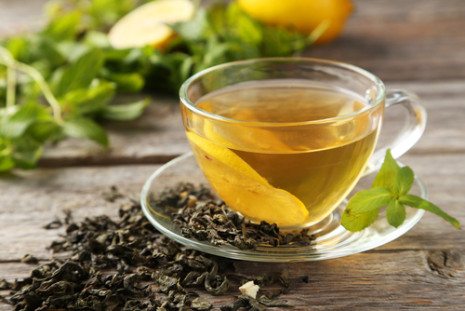
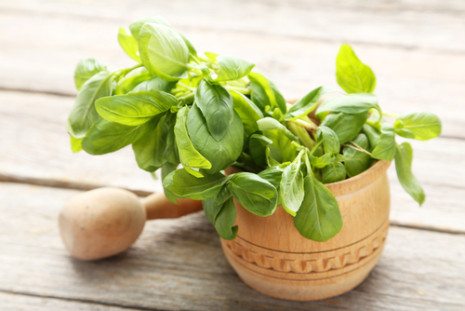
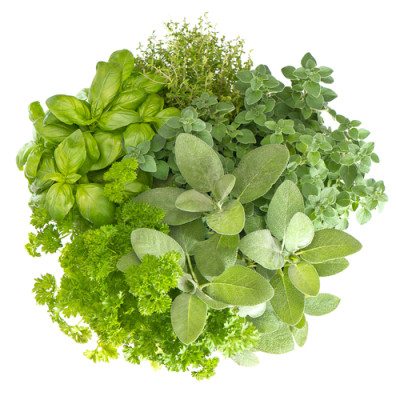

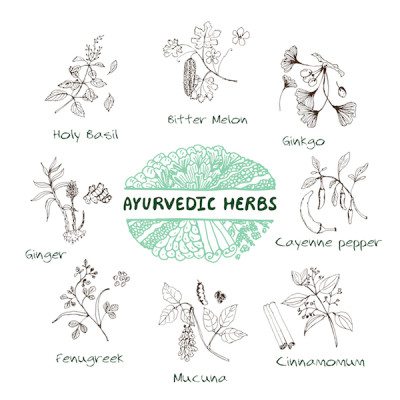
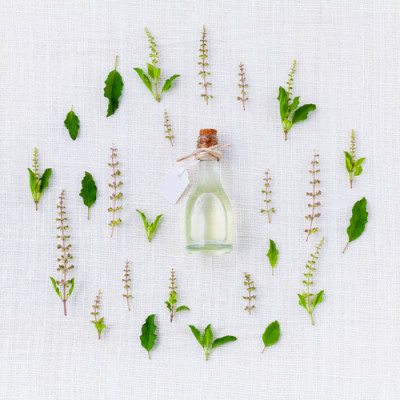

Like Italian Basil, Tulsi needs lots of sun. Without sun, she will not reach a very vibrant color and her leaves will wilt. She does really well here in Texas and in other climates similar to North India. You can find her sometimes at Indian stores or you can order seeds online. I recommend Krishna Tulsi which is almost purple in color. Once your plant gets prolific, its good to trim and use the manjaris (flowers) when they are young. Devotees of Krishna like to place these flowers at the feet of their Deities. The story of Tulasi devi/Vrinda devi is an interesting story.
The bug spray recipe doesn’t say how to make the holy basil water. Should I assume that we are supposed to boil one cup of holy basil in one cup of water?
Hi Adriana,
Yes. You are correct. You can take a cup of water and a handful of Holy Basil. You can boil the leaves in water and then let it cool. Make sure that you squeeze the leaves well so that the remaining liquid comes out. Then mix accordingly.
I hope you enjoy this natural spray.
Great post. I have also planted a tulsi plant in my garden last year on the suggestion of my doctor because of my less immunity. I used to get sick easily. Now I am using it daily while making my morning tea from last one year and I can see the changes in my immunity and my health now. It is very beneficial for our overall health. Thanks for sharing.
Hi Beauty! Sounds amazing – so glad to hear it’s been helping your immunity and health :) xx